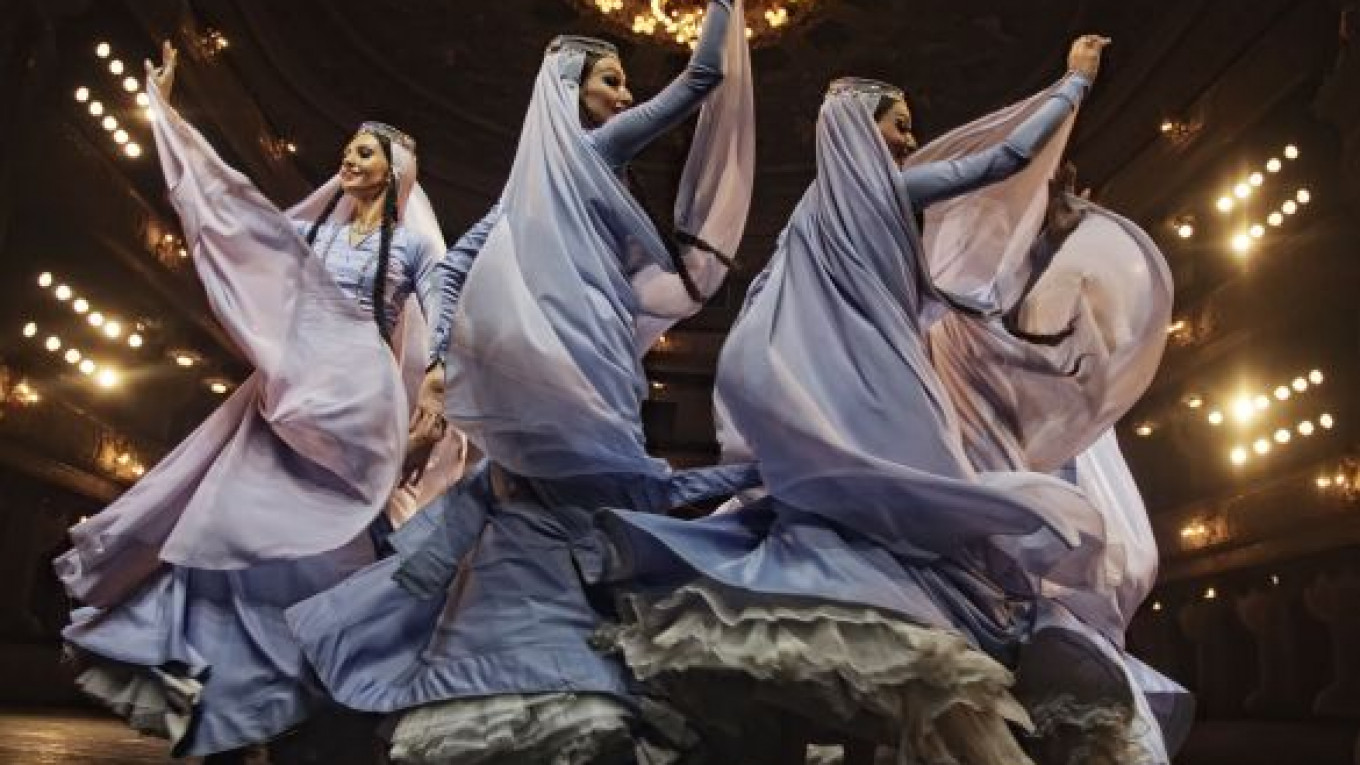As Russia's relationship with Georgia warms up after the new Georgian Prime Minister Bidzina Ivanishvili assumed power in Tbilisi, Moscow will host its long awaited Georgian guest, the famous Rustavi ensemble.
Rustavi, a folk dance and chorus group, will perform in Russia on Thursday after a 10-year absence.
"We are awaiting those spectators who love Georgia and Georgian culture," the head of the ensemble Anzor Erkomaishvili said on the eve of the concert, which takes place at Crocus City Hall.
Formed in 1968 in Soviet Georgia, Rustavi became one of the trademark symbols of Georgian culture, along with the republic's film production, one the Soviet Union's best.
Although Soviet audiences tended to turn off their television sets whenever they saw folk dancing on the screen, Georgian men dressed in traditional suits and armed with knifes, dancing the national dance "lezginka" have always managed to capture their attention.
"We have travelled all around the Soviet Union and we have received a warm welcome," Erkomaishvili said.
Despite a short, three-day military conflict fought between Georgia and Russia in 2008 over the breakaway South Ossetia region, many Georgians and Russians still have affection for each others' cultures.
The Georgian-made film "Mimino," a story of a helicopter pilot from a small Georgian town who becomes a pilot for Aeroflot national carrier became a cult classic during the 1980s. The main character Valiko Mizandari was played by actor and singer Vakhtang Kikabidze.
The majority of Russians also know the popular Georgian love song "Suliko," reportedly one of Joseph Stalin's favorites.
"Georgian song is very strong in its polyphony," Erkomaishvili said, adding that the trademark style of Georgian singing was even worshiped by renowned composer Igor Stravinsky.
Rustavi's repertoire consists of more than 700 songs. Among them is an old Georgian folk song "Chakrulo," which became one of the seven world songs sent to the space by NASA's Voyager Space Shuttle in 1977.
The return of Rustavi to Russia comes soon after local authorities gave the green light for the return of Georgian wine. The wines were banned in Russia due to the deteriorated relationship between the countries after the war. Rustavi's head Erkomaishvili said he saw the return of Georgian wine as a good sign.
"When I was young there was a joke that two Georgians and one bottle of wine is three voices singing," he said.
Rustavi will not be the only Georgian musicians performing in Crocus City Hall this week. On Friday it features a solo concert by the Georgian pop singer Tamara Gverdtsiteli who has also performed in classical opera.
Gverdtsiteli had enormous popularity in the Soviet Union and currently resides in Russia. Despite singing many songs in her native language, the singer is best known for her song, "Vivat korol" (Viva the King), written in 1989. Sung in a strong but passionate voice, the song is a tearful love ballad, dedicated to the legendary Soviet soccer player Oleg Blokhin, who was leaving the field for good.
Blokhin currently coaches the Kiev Dinamo team and said in one of his interviews that he cried when he heard the song.
"I wish I could have patented it," he said.
Rustavi performs on Thursday at 8 p.m. and Tamara Gverdtsiteli on Friday at 8 p.m., both at Crocus City Hall, located on the 66th kilometer mark of the Moscow Ring Road. Metro Myakinino. Tel: +7 495-550-0055. www.crocus-hall.ru. Running time: 1 hour, 30 minutes.
Contact the author at a.bratersky@imedia.ru
Related articles:
A Message from The Moscow Times:
Dear readers,
We are facing unprecedented challenges. Russia's Prosecutor General's Office has designated The Moscow Times as an "undesirable" organization, criminalizing our work and putting our staff at risk of prosecution. This follows our earlier unjust labeling as a "foreign agent."
These actions are direct attempts to silence independent journalism in Russia. The authorities claim our work "discredits the decisions of the Russian leadership." We see things differently: we strive to provide accurate, unbiased reporting on Russia.
We, the journalists of The Moscow Times, refuse to be silenced. But to continue our work, we need your help.
Your support, no matter how small, makes a world of difference. If you can, please support us monthly starting from just $2. It's quick to set up, and every contribution makes a significant impact.
By supporting The Moscow Times, you're defending open, independent journalism in the face of repression. Thank you for standing with us.
Remind me later.






